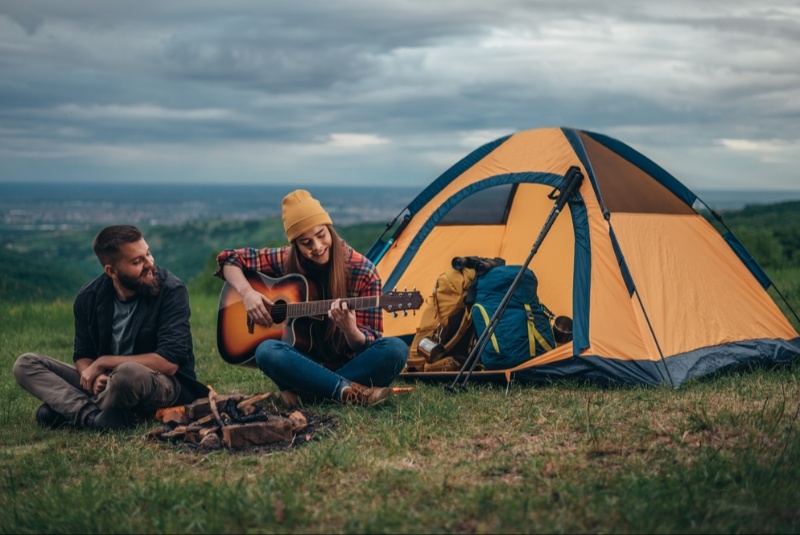Selecting the right camping tent is crucial for a comfortable and enjoyable outdoor adventure. With a variety of options available, finding the perfect tent can be overwhelming. This guide provides comprehensive insights into the key factors to consider, helping you make an informed decision and ensuring you choose a tent that meets your needs and enhances your camping experience.
Determining Your Camping Style
Before purchasing a tent, it’s essential to identify your camping style. Are you a solo backpacker, a family camper, or an expedition enthusiast? Your camping style influences the type of tent you need. Solo and lightweight backpackers require compact and lightweight tents, while family campers need spacious tents with multiple rooms. Understanding your camping style helps narrow down your options and ensures you choose a tent that complements your outdoor activities.
Assessing Tent Capacity
Tent capacity is a critical factor in selecting the right camping tent. Tents are typically rated by the number of people they can accommodate, ranging from one-person to family-sized tents. Consider the number of campers and the amount of gear you need to store inside the tent. For added comfort, it’s advisable to choose a tent with a capacity slightly larger than the number of campers. This extra space allows for gear storage and a more comfortable sleeping arrangement, ensuring a pleasant camping experience.
Evaluating Tent Seasonality
Tents are designed for different seasons, commonly categorized as three-season, four-season, or winter tents. Three-season tents are suitable for spring, summer, and fall, providing good ventilation and protection from rain and wind. Four-season tents are designed for harsher conditions, including heavy snow and strong winds, making them ideal for winter camping and mountaineering. Understanding the seasonality of the tent ensures you select a model that can withstand the weather conditions you will encounter, providing safety and comfort during your camping trips.
Considering Tent Weight and Portability
The weight and portability of a tent are crucial, especially for backpackers and hikers. Lightweight tents are easier to carry and set up, making them ideal for long hikes and backpacking trips. However, lighter tents may sacrifice some durability and space. For car campers, weight is less of a concern, allowing for larger and more robust tents. Assess your transportation method and how far you will be carrying the tent to determine the best balance between weight and functionality.
Evaluating Tent Materials and Durability
The materials used in the construction of a tent significantly impact its durability, weight, and weather resistance. Common materials include nylon and polyester for the tent body and aluminum or fiberglass for the poles. Nylon is lightweight and durable, while polyester is more resistant to UV damage. Aluminum poles are strong and lightweight, providing better support in adverse weather conditions compared to fiberglass poles. Evaluating the materials helps ensure you choose a tent that offers durability and protection suitable for your camping environment.
Understanding Tent Design and Layout
Tent design and layout play a vital role in comfort and functionality. Dome tents are popular for their easy setup and stability, while cabin tents offer vertical walls for more interior space and headroom, making them ideal for families. Tunnel tents provide excellent space-to-weight ratios, suitable for backpackers. Consider the tent’s interior layout, including the number of doors and vestibules for easy access and gear storage. A well-designed tent layout enhances convenience and livability, contributing to a more enjoyable camping experience.

Assessing Ventilation and Weather Protection
Proper ventilation is essential in a tent to prevent condensation and ensure a comfortable sleeping environment. Look for tents with mesh panels, windows, and roof vents that allow for adequate airflow. In addition to ventilation, weather protection is crucial. Ensure the tent has a durable rainfly and a waterproof floor to keep you dry during rainstorms. Sealed seams and quality zippers also contribute to weather resistance. Assessing these features ensures your tent provides a comfortable and protected shelter in various weather conditions.
Considering Ease of Setup
The ease of setting up and taking down a tent can significantly impact your camping experience. Look for tents with color-coded poles and simple instructions that facilitate quick and hassle-free setup. Freestanding tents, which can be moved around before staking, are generally easier to set up. Practice setting up the tent at home before your trip to familiarize yourself with the process. Choosing a tent that is easy to pitch saves time and reduces frustration, allowing you to enjoy your camping trip more fully.
Evaluating Price and Value
Camping tents come in a wide range of prices, from budget-friendly options to high-end models. Determine your budget and consider the features and quality you need. While it’s tempting to choose the cheapest option, investing in a high-quality tent can offer better durability, weather protection, and overall satisfaction. Look for tents that offer good value for money by balancing cost with essential features and durability. Reading reviews and comparing different models helps ensure you get the best tent within your budget.
Checking Additional Features
Additional features can enhance your camping experience and add convenience. Consider features such as gear lofts, interior pockets, and lantern hooks for organizing your space. Reflective guy lines and stakes improve visibility at night, enhancing safety. Some tents come with built-in LED lighting or footprint tarps for added ground protection. Assessing these additional features helps you choose a tent that offers added comfort and convenience, making your camping trips more enjoyable and stress-free.
Reading Reviews and Seeking Recommendations
Reading reviews and seeking recommendations from fellow campers can provide valuable insights into the performance and reliability of different tent models. Look for reviews that discuss the tent’s durability, weather resistance, and ease of setup. Joining online camping communities or asking friends for recommendations can also help you find tried-and-tested tents. Gathering information from multiple sources ensures you make a well-informed decision and choose a tent that meets your expectations and requirements.
Selecting the perfect camping tent involves careful consideration of various factors, including your camping style, tent capacity, seasonality, materials, and additional features. By understanding your specific needs and evaluating different options, you can find a tent that offers comfort, protection, and convenience. Investing in a high-quality tent ensures a pleasant and memorable camping experience, allowing you to enjoy the great outdoors with confidence and peace of mind. Whether you are a solo adventurer or camping with family and friends, choosing the right tent is the foundation for a successful outdoor adventure.




